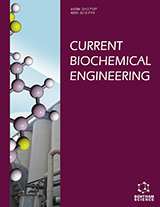Abstract
The main goal of this study was the characterization of the extremophile xylanases produced by Anoxybacillus sp. strain 3M, a thermophilic bacterium isolated from terrestrial hot springs (temperature of 90°C) samples collected on S. Miguel, Azores, Portugal. In this context, several batch fermentations using different agroindustrial wastes as inducer substrates (BSG – Brewers’ spent grain, wheat straw, sugarcane bagasse, and corn cobs) were performed towards an optimal enzyme production. The results for xylanase production showed that the higher enzymatic levels were obtained in the growth medium containing 1% (w/v) BSG (1.34 U mL-1), indicating that the BSG was the best inducer substrate, but the xylanase activity was also observed when wheat straw (1.33 U mL-1), sugarcane bagasse (0.80 U mL-1), corn cobs (0.30 U mL-1) and commercial xylan (0.21 U mL-1) were used as inducers. The extracellular crude enzymatic extract produced by Anoxybacillus sp. 3M in optimized submerged fermentation with BSG, attaining a maximal xylanase activity of 1.41 U mL-1 (i.e. 5-fold higher than with xylan), was further characterized for its optimal temperature and pH and stability. The highest enzyme activity was observed at a temperature of 60ºC and pH 5.3, but the enzyme retained 100% of its original activity after 96 h at 60°C and pH 7.0 and it still maintained 46% activity after 28 days at the same conditions. At 60ºC, the enzyme also retained its activity for pH ranging from 7.0 to 10.5. In addition, a zymogram of native gel analysis of the different culture supernatants revealed the presence of an enzymatic complex with an apparent molecular weight ranging from 400-500 kDa. Further application of strain 3M enzymatic extract to commercial oat spelts xylan revealed the presence of xylose and xylooligosaccharides (XOS), mainly X2 and X3, in the hydrolyzates produced. So, the thermostable and alkalistable extracellular xylanases from Anoxybacillus sp. 3M are biocatalysts with high potential for the development of processes where lignocellulosics are converted to precursors for several biotechnological applications.
Keywords: Anoxybacillus sp. 3M, xylanase activity, enzyme production, thermostability, alkalistability, agro-industrial wastes.
Graphical Abstract
 12
12 1
1













